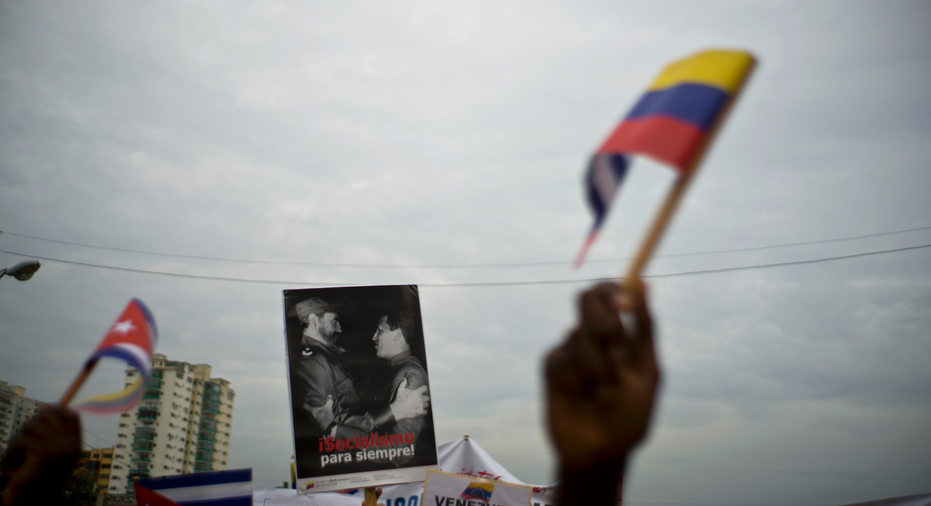AP Explains: What's behind Trump's sanctioning of Venezuela?

CARACAS, Venezuela – President Donald Trump signed an executive order imposing sweeping financial sanctions on Venezuela's government on Friday. Here's a look at why the U.S. decided to levy the penalties, which dramatically escalate tensions with the South American nation, and how likely they are to hurt Venezuela's economy and loosen President Nicolas Maduro's grip on power.
___
WHAT ARE THE NEW SANCTIONS?
The fourth round of sanctions announced by the Trump administration is the strongest yet. They prohibit U.S. financial institutions from engaging in any new financial deals with the Venezuelan government or state-run oil company PDVSA. This includes any transactions involving new debt or equity issued by the Venezuelan government or PDVSA. It also bans PDVSA's American subsidiary, Citgo, from sending dividends back to Venezuela as well as the trading of two bonds recently issued by Maduro's government to circumvent the growing financial stranglehold.
The Trump administration has already slapped sanctions against 30 senior Venezuelan officials, including Maduro himself.
___
WHAT PROMPTED THE TRUMP ADMINISTRATION TO TAKE SUCH STRONG ACTION?
The U.S. has been increasingly concerned that Maduro's government is heading down the path of dictatorship. A red line was crossed with a Supreme Court decision in March to gut the opposition-controlled congress. Although the ruling was reversed amid a storm of international criticism, the power grab triggered months of street protests and a government crackdown in which dozens have died.
The protests have since waned as a constitutional assembly wholly made up of government loyalists has been installed and proceeded to go after Maduro's political opponents. In the past three weeks, the all-powerful assembly has ousted the nation's outspoken chief prosecutor, taken over the powers of congress and created a "truth commission" that many fear will be used to target opponents. Several prominent opposition mayors have also been removed or ordered arrested by the government-stacked supreme court.
___
WHAT IMPACT WILL THE SANCTIONS HAVE ON MADURO'S GOVERNMENT?
U.S. officials hope that by turning up the heat on Maduro they will be able to peel off support from his last remaining civilian backers as well as the military, a key crutch and historically the arbiter of political disputes in Venezuela.
The sanctions will make it harder and costlier for Venezuela to scrounge up badly needed financing, raising the possibility that it will have to stop payment on its ballooning foreign debt. The government and PDVSA have about $4 billion in debt payments coming due before the end of the year but only $9.7 billion in international reserves on hand, the vast majority consisting of gold ingots that are hard to trade immediately for cash.
So far Venezuela has shown itself to be a reliable borrower, prioritizing bond payments to foreign lenders even while Venezuelans suffer widespread food and medicine shortages. It also has options in allies Russia and China. In the past both have stepped in to fill financial holes, albeit under increasingly exacting terms requiring Venezuela to put up part of the world's biggest oil reserves and even a 49 percent stake in Citgo as collateral.
___
WILL THEY AFFECT THE U.S OIL INDUSTRY?
Reflecting a strong lobby effort by the U.S. oil industry, Friday's action stopped short of cutting off U.S. imports of Venezuelan oil that are crucial both to Venezuela's economy and to U.S. refiners. But by making it harder for Venezuela to raise cash, the country's oil production, already at the lowest level in more than two decades, is likely to fall further. Foreign oil service suppliers still operating in Venezuela may also decide that the financial and reputational risk of doing business with the Maduro government has grown too high.
___
WHAT DO SANCTIONS MEAN FOR ORDINARY VENEZUELANS?
This is the first time the United States is explicitly targeting Venezuela's economy as a whole, although it is unclear how quickly the sanctions may be felt on the streets. U.S. Treasury Secretary Steven Mnuchin said the measures were designed not to pile further misery on the Venezuelan people.
But with the economy already reeling from widespread shortages, triple-digit inflation and a recession on the scale of the Great Depression, it's bound to have an impact sooner or later.



















